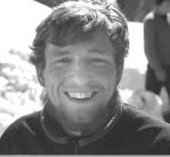Pascal Debrouwer was no stranger to many things
Like
everyone else who launches himself at great altitudes and similar challenges,
Pascal Debrouwer was passionate about mountains, as well as about landscapes
that communicate with heaven, and walking along paths forgotten by the
world. Already as an adolescent, he would set off on hikes with his
parents during the holidays: the Dolomites, Alps, Pyrenees, Massif Central,
etc. Anywhere where the greenery gave off the good smell of hawthorn
or conifer, where the verb 'to go up' took on its full meaning, Pascal
was happy.
So it was hardly surprising that at the age of sixteen he opted for
a career that blended a taste for physical effort and action-packed
living; and the under-officer's stripes from the Brasschaat military
school were really just a label through which Pascal was able to glimpse
the possibility of great adventures. At 18, he found himself in an elite
corps of the Belgian army; in times of war, the Special Reconnaissance
Team (SRT) is the first to be sent in to infiltrate and spy on enemy
positions. Then, a few years later, as a sergeant, he joined the 2nd
regiment of foot Chasseurs in Germany, where he was a top-level sports
instructor, organising courses for paragliding, kayaking, climbing.
 So it was no coincidence that one day Pascal became part of a military
expedition in the Himalayas: in 1992, he conquered his first 8 000 m
mountain, Cho Oyu (8 201 m) and two years later, severe weather conditions
stopped him in his ascent of Daulaghiri (8 167 m). In 1996, he was off
on a new adventure to the ends of the earth: this time, the team was
mixed (not just the military) but Annapurna was a tough nut to crack
- and the weather didn't help. When he returned, he made himself the
promise to organise his own expedition one day. And five months later,
in March 97, after selling his car and taking out a large personal loan
from his bank, he tackled the North slopes of Everest, the very same
slopes that have just cost him his life. Unfortunately, his survival
equipment was pinched at 8 300 m. It was during this expedition that
he met Joao Garcia, his future loyal companion and friend.
So it was no coincidence that one day Pascal became part of a military
expedition in the Himalayas: in 1992, he conquered his first 8 000 m
mountain, Cho Oyu (8 201 m) and two years later, severe weather conditions
stopped him in his ascent of Daulaghiri (8 167 m). In 1996, he was off
on a new adventure to the ends of the earth: this time, the team was
mixed (not just the military) but Annapurna was a tough nut to crack
- and the weather didn't help. When he returned, he made himself the
promise to organise his own expedition one day. And five months later,
in March 97, after selling his car and taking out a large personal loan
from his bank, he tackled the North slopes of Everest, the very same
slopes that have just cost him his life. Unfortunately, his survival
equipment was pinched at 8 300 m. It was during this expedition that
he met Joao Garcia, his future loyal companion and friend.
A few months later, in quick succession, he founded his travel agency,
Montagnes du Monde, and met his future wife, Nathalie Renard, a physiotherapist.
In 98, he went to Everest for the first time with clients, but was unsuccessful
once again - thanks to more rotten weather. This spring's expedition
on the North slopes in the company of some ten or so clients (including
Alain Hubert) was under the auspices of his mountain travel agency that
we wanted to really develop and take places with his wife. It was with
this aim in mind that two years ago he asked the army for three years'
unpaid leave, which was granted without a problem.
He lived and breathed Everest! Which is why, this spring, he returned
for a third time to the North slopes. One of his clients was Alain Hubert,
whom he had met at a lecture about the North Pole; we have not mentioned
it before in writing the expedition's homepage, but each time that we
had Hubert on the line, he always took the opportunity to mention the
perfect harmony that reigned within the group, the charisma that Pascal
enjoyed with those who approached him, and his qualities as a climber.
He also expressed his delighted surprise that a "beginner" (he did not
use this term, but he thought it) could be so professional in organising
a Himalayan expedition, which is always a great challenge in itself.
Then came the fatal descent of Wednesday 19th May, during which Pascal
fell. No doubt a foot placed ten centimetres off the track. Or a patch
of snow that slipped. Maybe a false step. Or perhaps a fleeting dizzy
spell that caused him to lose his balance.
To all those who as a result of this drama will naturally come up with
their false indignation and the arguments that tend to end in "Those
guys are nuts" that we hear so often in cafés and bars, we would like
to reply that as Tolkien wrote (about the Elves), the human race is
divided into two: those who understand that man has to risk everything
in order to discover what there is beyond the horizons of our dreams;
and then there are those for whom the dream does not even exist.